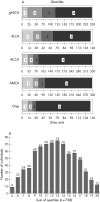New serological markers in inflammatory bowel disease are associated with complicated disease behaviour
- PMID: 17456509
- PMCID: PMC2000264
- DOI: 10.1136/gut.2006.108043
New serological markers in inflammatory bowel disease are associated with complicated disease behaviour
Abstract
Background and aims: Several antibodies have been associated with Crohn's disease and are associated with distinct clinical phenotypes. The aim of this study was to determine whether a panel of new antibodies against bacterial peptides and glycans could help in differentiating inflammatory bowel disease (IBD), and whether they were associated with particular clinical manifestations.
Methods: Antibodies against a mannan epitope of Saccharomyces cerevisiae (gASCA), laminaribioside (ALCA), chitobioside (ACCA), mannobioside (AMCA), outer membrane porins (Omp) and the atypical perinuclear antineutrophilic cytoplasmic antibody (pANCA) were tested in serum samples of 1225 IBD patients, 200 healthy controls and 113 patients with non-IBD gastrointestinal inflammation. Antibody responses were correlated with the type of disease and clinical characteristics.
Results: 76% of Crohn's disease patients had at least one of the tested antibodies. For differentiation between Crohn's disease and ulcerative colitis, the combination of gASCA and pANCA was most accurate. For differentiation between IBD, healthy controls and non-IBD gastrointestinal inflammation, the combination of gASCA, pANCA and ALCA had the best accuracy. Increasing amounts and levels of antibody responses against gASCA, ALCA, ACCA, AMCA and Omp were associated with more complicated disease behaviour (44.7% versus 53.6% versus 71.1% versus 82.0%, p < 0.001), and a higher frequency of Crohn's disease-related abdominal surgery (38.5% versus 48.8% versus 60.7% versus 75.4%, p < 0.001).
Conclusions: Using this new panel of serological markers, the number and magnitude of immune responses to different microbial antigens were shown to be associated with the severity of the disease. With regard to the predictive role of serological markers, further prospective longitudinal studies are necessary.
References
-
- Vermeire S, Rutgeerts P. Antibody responses in Crohn's disease. Gastroenterology 2004126601–604. - PubMed
-
- D'Haens G R, Geboes K, Peeters M.et al Early lesions of recurrent Crohn's disease caused by infusion of intestinal contents in excluded ileum. Gastroenterology 1998114262–267. - PubMed
-
- Rutgeerts P, Goboes K, Peeters M.et al Effect of faecal stream diversion on recurrence of Crohn's disease in the neoterminal ileum. Lancet 1991338771–774. - PubMed
Publication types
MeSH terms
Substances
LinkOut - more resources
Full Text Sources
Other Literature Sources
Miscellaneous





